Artists
Aivar Arak, Martin Arak, Kalle Vassila "The Sound of Three Village Kannels"

Alika and Arno “Tracing the roots”
.png)
Cätlin and Marko Mägi with Finlay MacDonald and Ali Hutton
Two duos playing Estonian and Scottish traditional music!
Estonian and Scottish music and musicians Cätlin and Marko from Estonia and Finlay and Ali from Scotland come together for the second time in this unique collaboration to share their music not only with each other but also with their audiences. Their first performance was at the Edinburgh International Festival in the summer of 2024, where their shared passion for music and performing brought immense joy. Now, they aim to bring this same jolly and heartfelt experience to the audience at the Viljandi Folk Music Festival.
Both duos, Cätlin & Marko and Finlay & Ali, have played together for a long time in their respective ensembles. Now, these two established duos unite and form a dynamic quartet that breaks stylistic and cultural boundaries with their music.
Cätlin & Marko Mägi play mainly Estonian traditional music. Their tunes offer a unique mix of ancient bagpipe and jaw harp melodies paired with modern saxophone improvisations.
Finlay MacDonald is one of Scotland’s top pipers, who blends tradition with modern influences to create a distinctive sound. He joins forces with Ali Hutton, a talented multi-instrumentalist skilled in guitar, whistles, and bagpipes, whose energy and versatility add vigour and diversity to their performances.
Cätlin Mägi - bagpipe, Jew’s harp, whistles
Marko Mägi - saxophones
Finlay MacDonald - Scottish bagpipes, whistles
Ali Hutton - guitar

Cätlin Mägi & UT VCA, EAMT, MUBA ja Heino Eller Music College teachers and students “In Search of My Story”
Students of Heino Eller Music College, guided by Sänni Noormets:
Sänni Noormets - fiddle, talharpa
Susi Eerin Heinlo - fiddle
Pauliine Kaare - fiddle
Andro Ojakäär - accordion
Georg Raimond Õunap - guitar
Students of The Estonian Academy of Music and Theatre, guided by Karoliina Kreintaal:
Karoliina Kreintaal - fiddle, vocals
Marion Selgal - vocals
Monika Väliste - flute
Eva Eensaar-Tootsen - vocals
Katariin Raska - jaw’s harp
Students of University of Tartu Viljandi Culture Academy, guided by Villu Talsi:
Cätlin Mägi - jaw’s harp
Villu Talsi - guitar, mandolin, vocals
Helery Kõrvemaa - bagpipe
Simone Minn - viola
Villem Suits - keyboard instruments
Marta Helena Hansing - fiddle
Students of Tallinn College of Music and Ballet MUBA, guided by Susanna Mõtsmees:
Susanna-Viktoria Mõtsmees - flute,
bagpipe Mart Adermann - guitar
Marta Kiho - fiddle
Karmen-Johanna Kärmas - fiddle
Liidia Baranyai - chromatic kannel

Curly Strings
Curly Strings is an acoustic four-piece band that draws its inspiration from their own personal heritage in the current Estonian cultural space. Intense and playful ensemble work paired with a sincere presentation of their original music form the main basis of Curly Strings’ soundscape. The band’s rise in the Estonian music scene in 2013 was a phenomenon unlike any other: a folk music artist became mainstream by collecting national music awards and being the top seller in music stores for more than a year. They bring their unique Baltic take to the acoustic music world in combining the familiar with the unfamiliar, having catchy heartfelt songwriting side-by-side with folk music aesthetics, making them an exciting act to look out for.
Eeva Talsi – fiddle, lead vocals
Villu Talsi – mandolin, vocals
Peeter Hirtentreu– guitar, vocals
Taavet Niller – upright bass, vocals
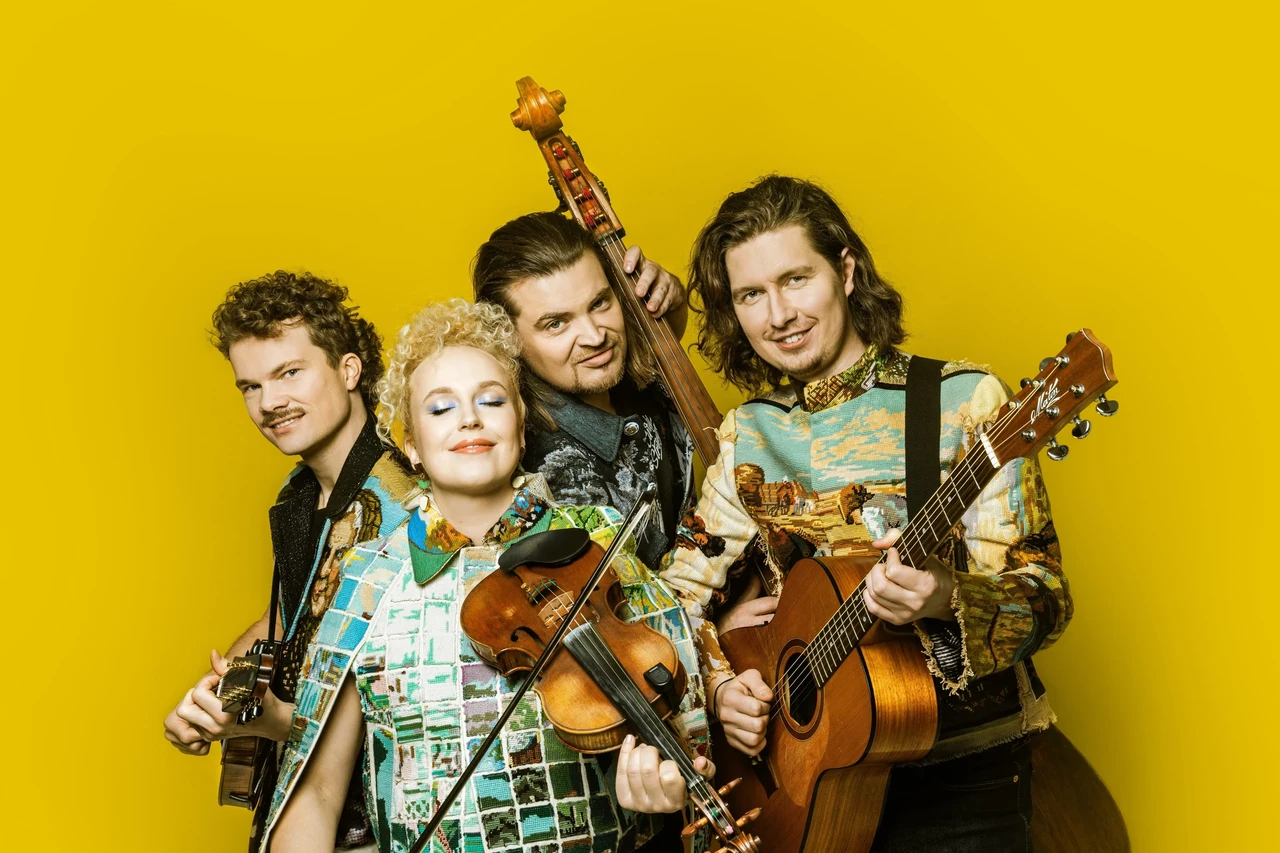
Duo Ruut
Duo Ruut's (Duo Square) sound is based on the common ground that two young musicians and songwriters with a fairly different background and taste, Ann-Lisett Rebane and Katariina Kivi are exploring together.
Their sound ties together a single Estonian zither and two distinct voices. Inspired by the traditions of their Estonian heritage, they draw influence from both the beliefs of different cultures and their own contemporary and emotive songwriting. As they are composing on one instrument Duo Ruut’s music is minimalist at its core but packed with new and imaginative ideas. Sometimes the barest, most minimal music can hit the hardest.
They stand either side of the zither, each plucking and strumming its strings and sometimes tapping its body for percussive purposes. This single instrument creates, what Mojo called “a band sized sound”. And then come the rising voices, gently soaring, gently circling, dovetailing and interweaving, calling and responding. It’s an extraordinarily intimate experience – beguiling, bewitching and undeniably transportive. It’s like something you’ve never heard before.
In a short period of time a duo hailing from the Northern Coast of Estonia has toured around the world at prestigious festivals and venues such as ESNS, Womex, Celtic Connections, Trans Musicales, PIN, TMW, MENT, Pohoda Festival, Stimmen Festival, Elbphilharmonie etc. The last couple of years have brought them concerts in more than 20 countries around the globe. In 2025 they reached outside of their home country with almost 40 concerts. Their music has been supported by international media such as KEXP, BBC, MOJO, The Guardian, Songlines, The Arts Desk, Louder Than War, FIP Radio, RFI, Culturebox TV France etc.
In addition to their debut album “Tuule sõnad” (‘Words of the Winds’ 2019) and EP “Kulla kerguseks” (“Golden Light” 2021), Duo Ruut is soon going to release their second full album. The upcoming album “Ilmateade” (“The Weather Report”) tells stories from different times, different people and most of all, from different weathers. Using Estonian traditional texts as song lyrics, it is a testament to the fact that the weather is not just a passive element behind our windows, but instead an ever-changing character that has more power over us than we care to remember in our busy daily lives.
"Local twosome Duo Ruut, who double up on a single zither – it’s used as a drum kit as well as a stringed instrument – to create a band-sized sound with high-keening, folk-style harmony singing, to stirring effect" - MOJO, Ian Harrison
“At first it seems very minimal, but then it becomes transfixing. They have ethereal voices and slowly draw you into the world. There was a real buzz among the delegates afterwards” – Songlines at Tallinn Music Week, Simon Broughton
Ann-Lisett Rebane & Katariina Kivi - one zither on four hands, vocals

Džambo Aguševi Orchestra
Džambo Agušev leads the funkiest brass band throughout the Balkans, which is reshaping Balkan music with his 21st century brass fusion. Džambo Aguševi Orchestra is the only non-Serbian band to ever win the award of Guča, the best known festival of brass bands in Serbia. The Orchestra have performed to huge acclaim in Sweden, Germany, UK, France, Colombia, Hungary, USA, Italy, Romania, Poland, Czech Republic, Switzerland, Albania, Serbia, Croatia, Slovenia, Spain, Slovakia, Austria, Norway, Turkey, Austria, Greece, Mexico etc. The Džambo Aguševi Orchestra’s music is dynamic, fierce, funky and innovative: the orchestra was declared by Songlines Magazine (UK) as one of the world’s most exciting bands. Over the last 10 years, the orchestra has received many invitations from the top world music festivals. Their album Brasses For The Masses has been released for Asphalt Tango Records and was praised by international critics and received German Critics Pool award. They have played with many highly acclaimed musicians, including Husnu Senlendirici, Dubioza Kolektiv, Jovan Pavlović, Fanfare Ciocarlia, Olcay Bayir, Serhan Cagri, Mamak Khadem, Natsha Atlas and others.
Džambo Agušev - trumpet, vocals
Kočo Agušev - trumpet
Sunaj Mustafov - trumpet
Kjerem Jusinov - trumpet
Ali Zekirov - tenor horn
Džafer Fazliov - tenor horn
Mustafa Zejnelov - tenor horn
Shukri Djevatov - helicon
Orfej Chakalovski - big drum, vocals
Redjep Nedjatov - drums
EHALE

Elizabeth Davidson-Blythe & Daniel Quayle
Whether they’re burning through reels or setting the scene for a meditative air, audiences are enraptured by their fresh new take on a musical tradition like no other. Their aim as a duo is to bring Manx music to the masses, and they have already performed at some of the scene’s most prestigious festivals.
Elizabeth and Daniel are set to release their highly anticipated second album in 2025, building on their unique fusion of tradition and innovation. As they continue to evolve, they remain committed to sharing the rich musical heritage of the Isle of Man with audiences around the globe.

Estlager Trio “In Search of Village Musicians”

Ethno Estonia

ETHNO Estonia Youth

Eva Mitreikina
Eva Mitreikina (with Ingrian-Finnish, Estonian, possibly Ukrainian, Russian, and Jewish roots, and, according to a genetic test, Tatar ancestry) who was born and spent her early childhood in Kabardino-Balkaria, is a singer and multi-instrumentalist. She performs both her own songs and traditional music from different cultures.
In her music, Eva searches for a deep, almost primal connection with sound. She explores its tiniest elements, as if looking at it under a microscope. Her style is minimalist, like a pencil drawing with just a few colours, leaving space between the notes for something invisible, something that connects everything. There is pain in her music, but also beauty and hope. Longing for a dawn redwood tree. Eva’s dreamlike music feels both ancient and thoughtful. Her voice makes you pause, listen, and reflect. Eva has released two solo albums of her own songs. One of them was chosen by Eesti Ekspress as album of the week, and described as: “Delicate and flickering, pleasantly cold, like a snowflake landing on your cheek.” Eva teaches folk instruments and solfeggio at Kuressaare Music School. She rarely performs live and was last seen singing at the Viljandi Folk Music Festival with the folk-metal band Raud-Ants.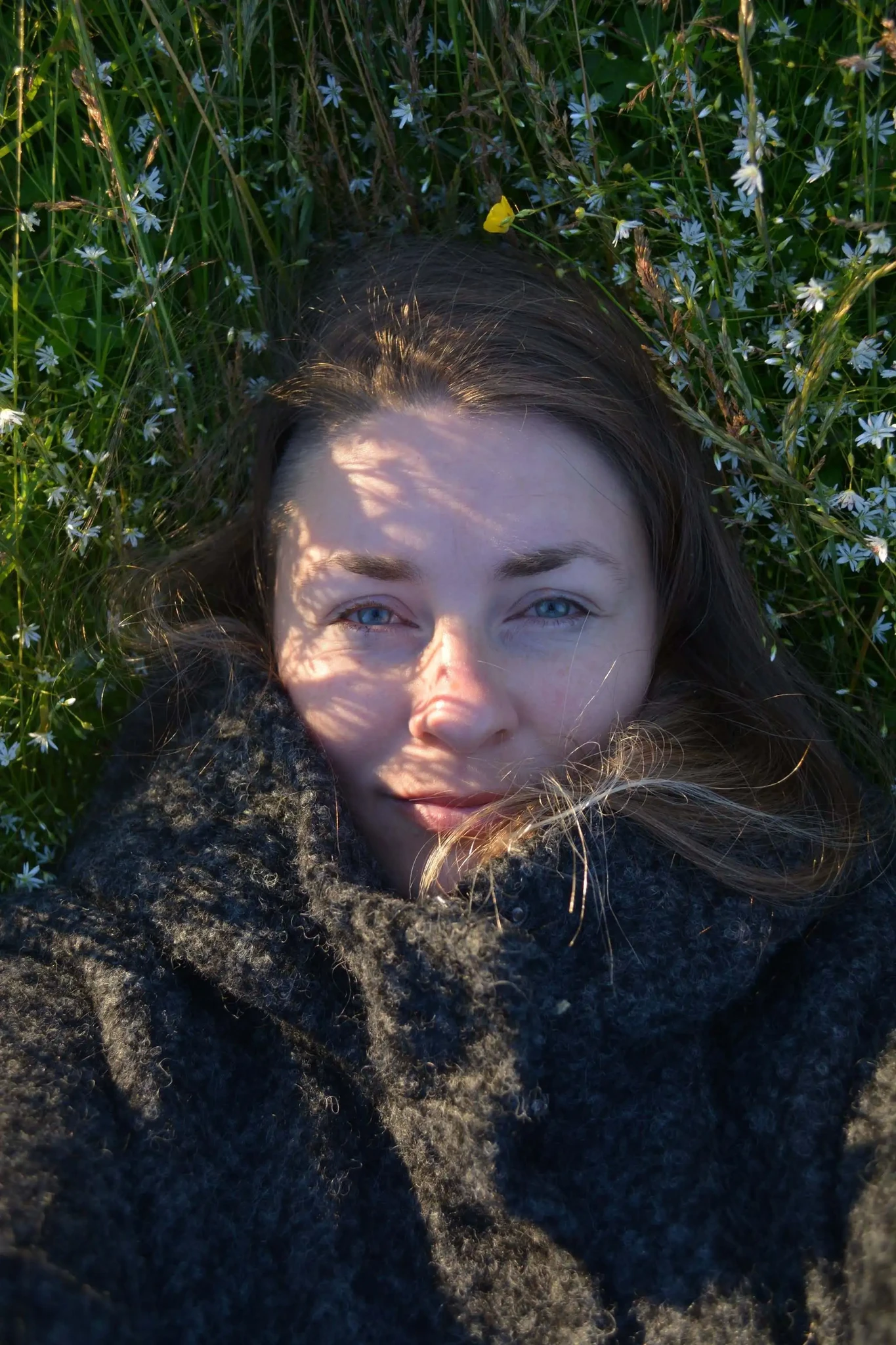
Eva Väljaots & Arja Kastinen

Hanna-Reet Ruul

Haydamaky
The Ukrainian ethno-rock band Haydamaky are known not only in their home country but also across Europe and beyond the ocean. The band, which has been on stage for 20 years, continues to surprise their fans. Their music is a modern blend of global styles – from Ukrainian folk to Jamaican reggae. The artists are constantly experimenting with sounds, but one thing remains constant: Ukrainian folk melodies and dynamic brass section.
Since 2001, Haydamaky have recorded and released 8 albums, 2 of which have become "golden" records.
The band frequently collaborates with international stars such as Che Sudaka, Apollo 440, Kamil Bednarek, Kellerkomando, Vavamuffin, Brother Culture and others. Thanks to these collaborations, they bring Ukrainian musical DNA to international audiences and have earned a prominent place in the European music scene. Haydamaky have performed at the most famous European festivals, toured across the old continent, played hundreds of club concerts, and earned two European Golden Discs. For this reason, fans refer to the band as "ambassadors of Ukrainian culture."
The band is actively involved in the democratic transformations and events taking place in Ukraine. The most significant events in the country's recent history are constantly reflected in the band's creative work. Since the beginning of the full-scale invasion, three of the band's musicians have taken up arms to defend their homeland, while the others are involved in volunteer efforts and continue their concert activities.
Roman Dubonos - trompet, back vocals
Martin “DJ Kwazar” Cislo - DJ, electronic instruments, percussion
Yuriy Kondratiuk - guitars
Ruslan Trochinskyi - trombone
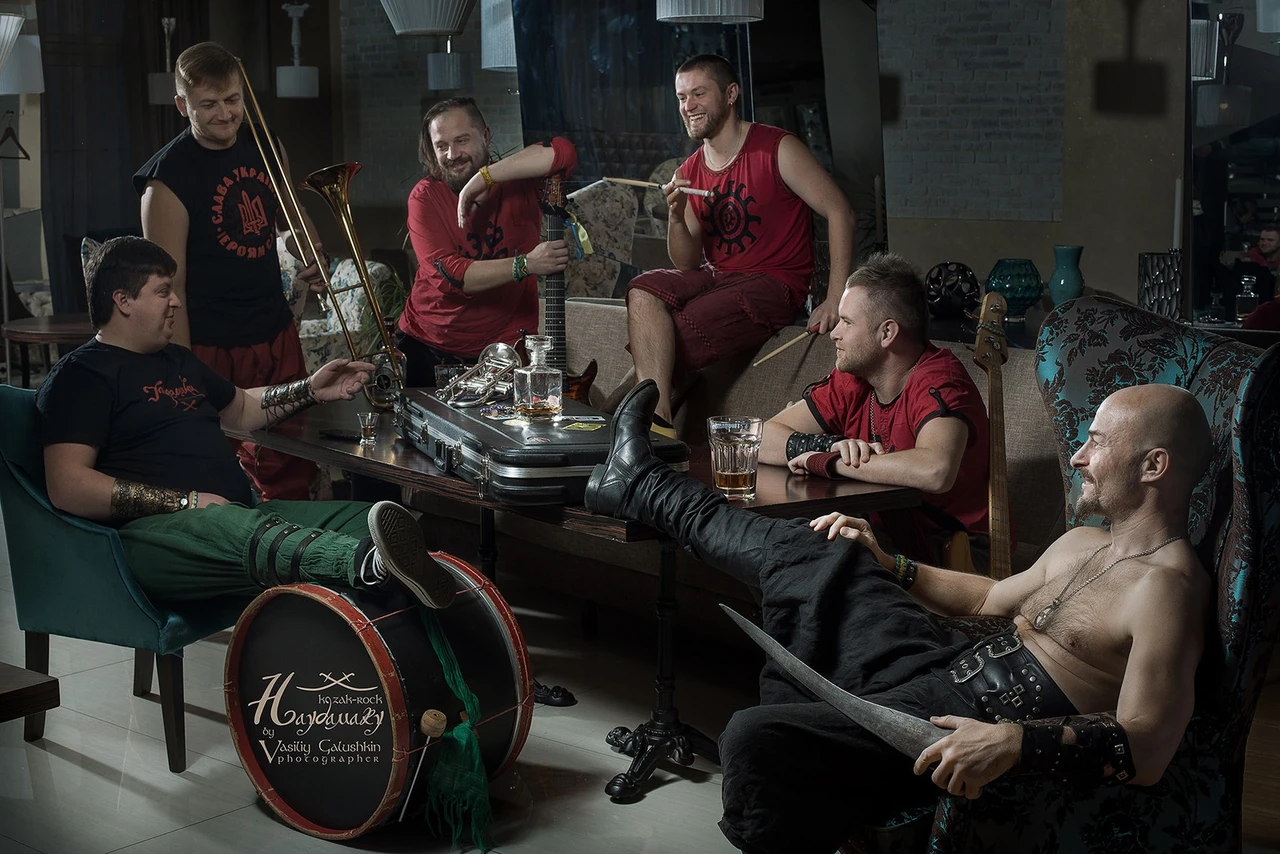
Ímar
BBC Radio 2 Folk Award winners, Irish/Manx/Scottish quintet Ímar are amongst Glasgow’s hottest folk property. With a wide-reaching fanbase throughout the UK, Europe, USA and Canada, the quintet have fast become one of the trad scene's most talked about group – thanks in no small part to their debut video, “L’Air Mignonne”, becoming a viral smash in 2016, catapulting the group to the attention of audiences and media worldwide.
Their two albums – Afterlight and Avalanche – have since amassed a devoted listenership, whilst live audiences are transfixed by Ímar's collective and individual technical prowess. With a line-up boasting a heavyweight haul of top solo prizes – including nine All-Ireland and eight All-Britain titles – the group's collective synergy and live energy is positively electric. The five men share a strong background in Irish music; a grounding that underpins many of Ímar’s distinctive qualities, in both instrumentation and material. Indeed, the group's very being embodies a personal reconnection with its members’ formative years, dating back long before their recent camaraderie around Glasgow’s celebrated session scene. The shared cultural heritages between Scotland, Ireland and the Isle of Man are well documented: all three once shared the same Gaelic language, and a similar, clearly potent, kinship endures between their musical traditions.
Adam Brown - bodhrán
Adam Rhodes - bouzouki
Mohsen Amini - concertina
Ryan Murphy - uilleann pipes
Tomás Callister - fiddle
Julgī Stalte, Ēriks Zeps & TKP

Kader Tarhanine
Abd Elkadir Sabou – lead singer, guitar
Mohammed Zenani – medium guitar, backing vocals
Drissa Kone – bass guitar, backing vocals
Mahalmadane Abbanassa Traore – drums

Kaisa Kuslapuu
Kaisa Kuslapuu is a musician, songwriter, and music teacher from Võru. Her music is shaped by a blend of classical, jazz, and traditional folk influences. Her songs have a sensitive core, but often leave space for the playful humour and curiosity typical of South Estonians. In recent years, she has performed with several groups, including Lonitseera, 6hunesseq, the Kaisa Kuslapuu Trio, Epifolium Caterva, and the duo Kaisa Kuslapuu & Karl Laanekask. Her band Lonitseera, which performs her original songs, released its debut album “Tapeet” in 2023. The album won the Estonian Music Award for Best Singer-Songwriter Album of the Year. Kaisa is currently fascinated and inspired by the culture of the Finno-Ugric peoples, fresh air, and the history of Estonian popular music.
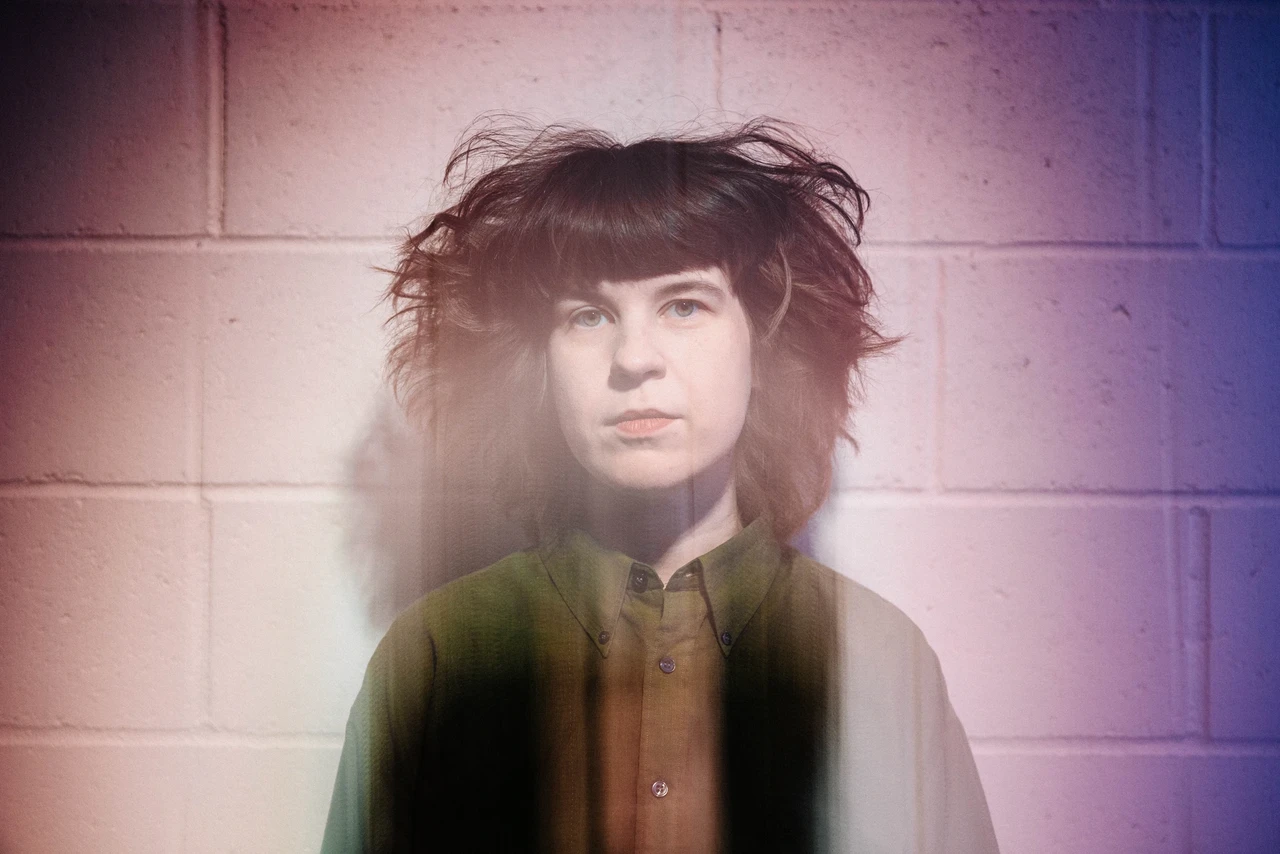
Kait Tamra
Living on his grandparents’ old farm near Pikakannu in Võrumaa, Kait Tamra is a composer and singer-songwriter whose work reflects a deep sensitivity to nature, home, and humanity.
Kait began his musical journey at the Võru Music School and now works as a violin teacher in his home region, as well as giving solo concerts across Estonia. His songs have been performed at the national Song Celebration, and his piece “Oma saar”, set to his own lyrics, became a favourite among choirs at the XXVI Song Festival. Kait usually performs alone, accompanying himself on piano. His songs often focus on lasting and meaningful values: honesty, care, dignity, and respect for one’s land, language, and people. As he has said himself, he doesn’t sing anything that doesn’t feel true to his heart.
Joining him on stage will be Nora and Mia Tamra on violins.
Kait Tamra - vocals, piano
Nora Tamra - fiddle
Mia Tamra - fiddle
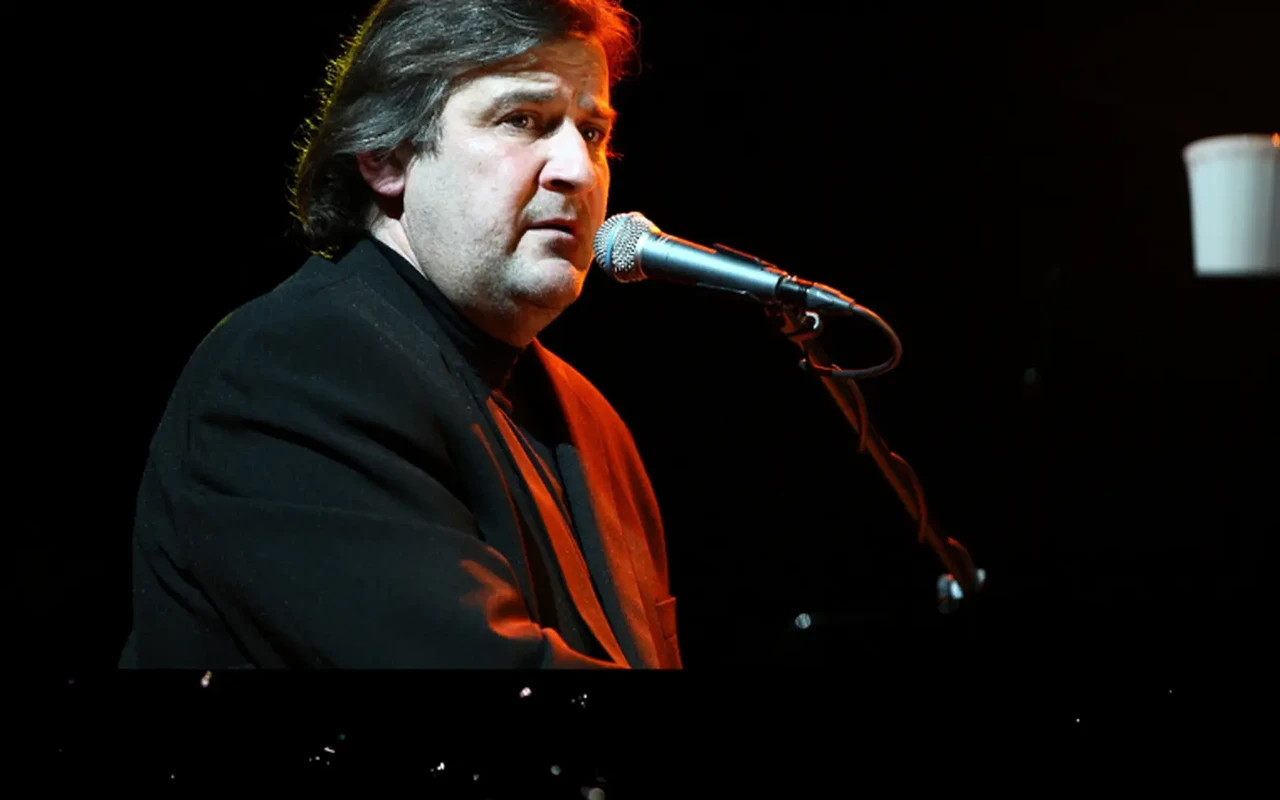
Kihnlasõd

Kirbla Trio
Katariin Raska – jaw harps
Leanne Barbo – kannels
Natali Ponetajev – Teppo type diatonic accordion
Haar Tammik – sound engineer

Kristjan Glück
Kristjan Glück is a self-taught musician from Viljandi. His style is a blend of different genres and with every new project, he likes to experiment and discover new ways to express himself through music and songwriting. He combines folk instruments and traditional elements with modern production. Taking influence from Estonian nostalgia, folklore and everyday discoveries, he crafts soundscapes and stories from diverse emotions and personal experiences. With his live performances, he emphasises the importance of human connection, the beauty of being unique and feeling free to move your body in the ways that it wants to move.
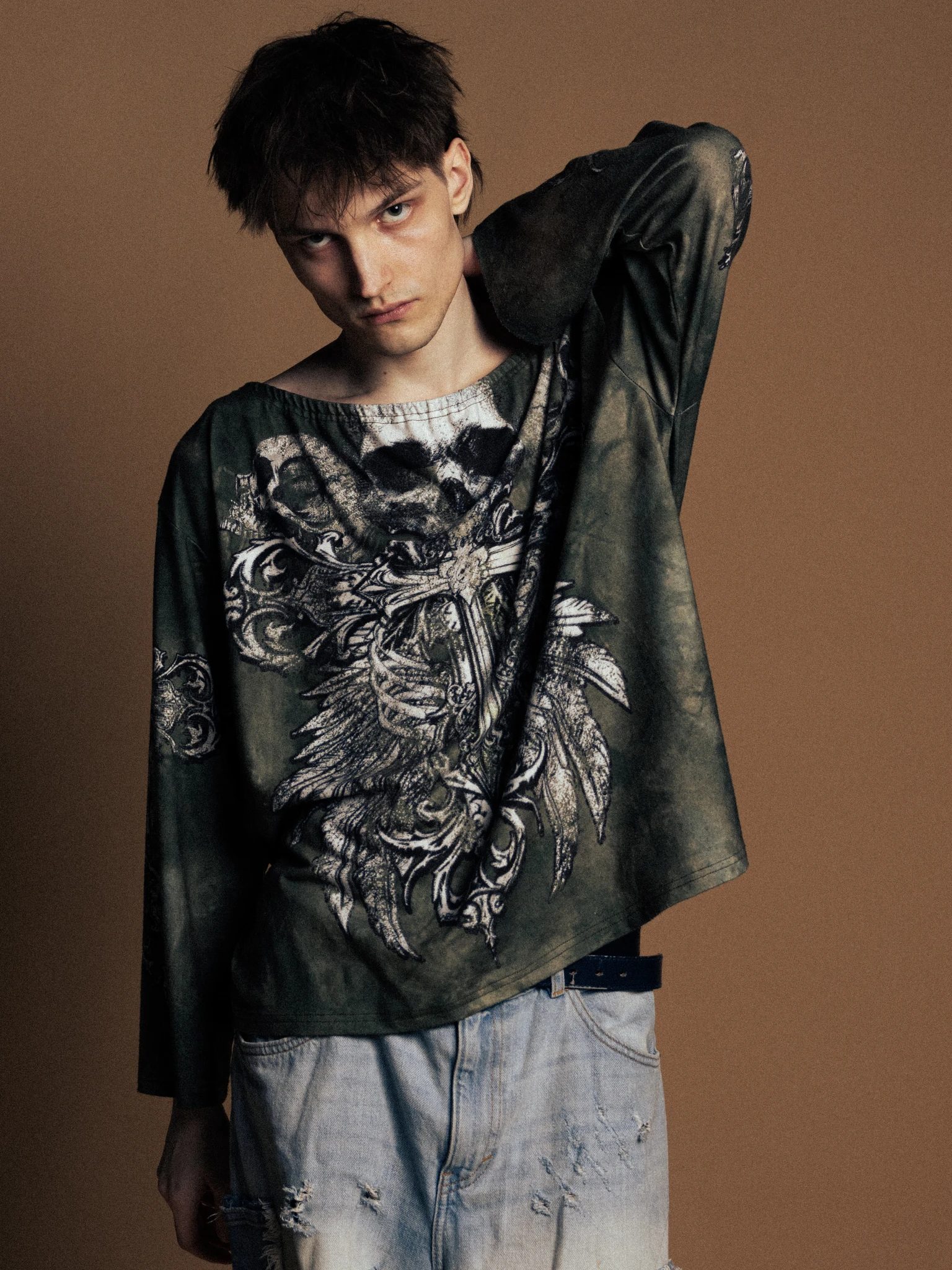
Kukerpillid
Kukerpillid, a folk band formed by students of the Academy of Arts, had their first public performance on the 1st of April 1972, on an Estonian TV show. Since then, they’ve performed in Estonia and around the world, sometimes alone and sometimes with well-known Estonian singers and dance groups, played folk songs, country music (particularly bluegrass and cajun styles), rockabilly, and their own original compositions, won awards at festivals, studied folk music archives, and recorded songs from traditional singers across Estonia. Kukerpillid have recorded over hundred songs and tunes, released 24 albums, some of them compilation albums, many cassettes and collaborative albums with other artists.
Toomas Kõrvits – vocals, guitar
Ike Volkov – vocals, bass
Tiit Kõrvits – guitar, vocals
Heiki Vahar – fiddle
They have many friends too: former band members Arne Haasma, Tõnu Raadik, Indrek Kalda, Vello Toomemets, and others they still work with. Sadly, some members and friends, like Taivo Linna, Jaan Arder, Kaarel Kilvet, and Henno Käo, have passed away.
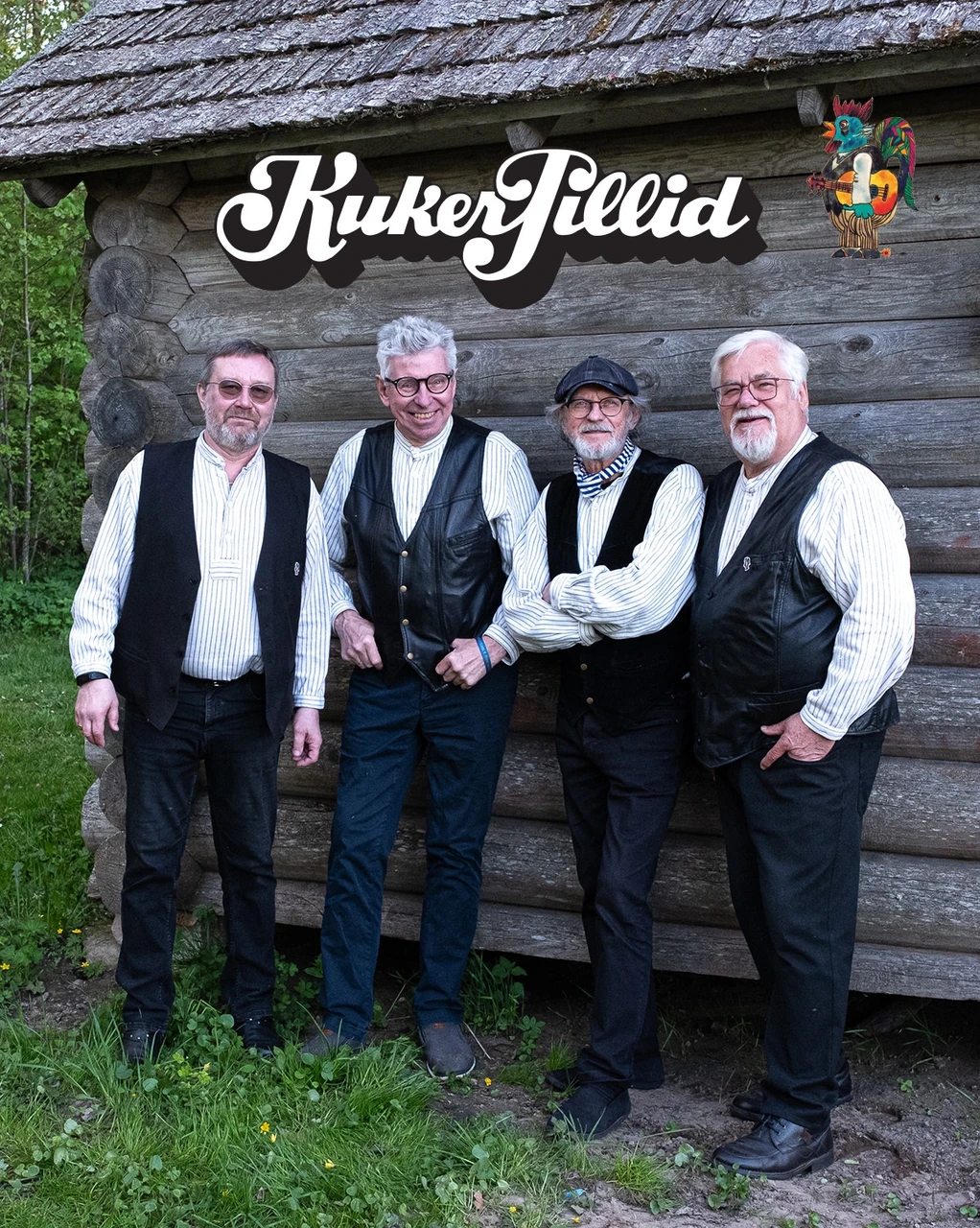
Laposa Julcsi & the Band

Lõõtsanøøbid & Vennaskond “Off the Ground and Away to the Sea!”

Magalí Sare & Manel Fortià
_large.webp)
Maimu Jõgeda

Mari Kalkun
"I was curious about how people before me have thought and sung about the world. I wanted to explore ancient traditions and link them to what I see happening today. I was drawn to exploring the very beginning – the creation and recreation of the world – and I also wondered if old songs could speak about things like climate change or overconsumption," says Mari Kalkun. The album talks about the power of words, the world tree that could block the sun, and the soulless ideal golden woman, a symbol of today’s obsession with perfection.
The main theme of Stories of Stonia is the controversial relationship between humans and nature. It combines old traditions with modern influences. Some of the lyrics were written by contemporary Estonian and Võro poets, as well as by Kalkun herself. The album title refers to the creation of a mythical world through words and music. In her live performances, Mari’s voice, kannel, piano, and electronic sounds come together to create rich, atmospheric music that takes the audience on a journey to a very different time and space.
The album was co-produced by a renowned British musician Sam Lee and released by Real World Records (UK). It has received widespread praise, including a 5-star review from the Financial Times, first place on the Transglobal World Music Chart and being listed among the best albums by Songlines magazine. Mari has already performed the album in 20 countries, including Canada, the UK, Norway, Belgium, Portugal, South Korea, Australia, and Japan. In 2023, she won the Etnokulp Award for Artist of the Year. At the Estonian Music Awards, Stories of Stonia won Best Ethno/Folk/Traditional Album and was nominated in four categories. It also received the "Golden Record 2024" Award.

Meelika Hainsoo, Krista Citra Joonas, Andre Maaker “River of Stories”
Meelika Hainsoo – vocals, talharpa, fiddle
Krista Citra Joonas – bansuri
Andre Maaker - guitar

Musica Borealis
Anna-Liisa Eller – kannels
Marco Ambrosini – nyckelharpa
Taavi Kerikmäe – harmonium and clavichord

Naised Köögis

Natig Rhythm Group
Feel the Pulse of the Azerbaijan!
Get ready for an unforgettable explosion of rhythm, spirit, and tradition! Straight from the heart of Azerbaijan, Natig Rhythm Group, founded by the legendary Natig Shirinov, brings the ancient art of nagara drumming to life with unmatched energy and contemporary flair.
Known for their breathtaking stage presence, intricate rhythms, and cultural depth, Natig Rhythm Group transforms every performance into a musical journey that connects East and West, tradition and innovation.
Let the drums speak. Let your heart answer.
Natig Shirinov
Umid Shirinov
Hikmat Rzayev
Namig Shirinov
Sevil Shirinova

Nikns Suns 20 “Folk Rocks, Hell Yeah!”
Anniversary Concert Lineup:
Ragnar Toompuu – guitar, vocals
Merike Paberits – hurdy-gurdy, synthesizer
Priit Oks – vocals
Taavi Langi – guitar
Tanel Kadalipp – bass guitar, vocals
Kristo Joosep – drums
Kulno Malva – bagpipes, accordion, vocals
Erki Uus – bass guitar, vocals, harmonica
Martin Hanson – percussion, vocals
Madis Nõmme – solo guitar

NOËP Goes Folk vol II

OOPUS

Paabel “Off the Ground!”
As part of the festival's special production, Paabel, with an expanded lineup, presents a whole concert of new music inspired by the motif "Off the Ground!".
On Thursday evening, the band will take the audience on a journey through the regilaul "Suur Tamm" (The Great Oak). It is possible that this oak tree once symbolized the Milky Way galaxy in the night sky for our ancestors. This mystical glowing shape was believed to have several mythical properties: it could be a bridge connecting the living on Earth with those who had passed away, the stars around and within it were thought to represent human souls from the afterlife, and by observing it, one could predict the upcoming harvest. Earth and sky; life and death; the thunderous passage of centuries in an eternally unfolding universe, where images of the deepest inner world of humanity and the vast mysteries of outer space open up simultaneously – all of this, and more, is hidden within our ancient folk songs. To bring these sounds to life, the ensemble Paabel will come together once again on stage!
Sandra Sillamaa
Tanel Kadalipp
Arno Tamm
Lauri Kadalipp
Tõnu Tubli
Jaan Jaago
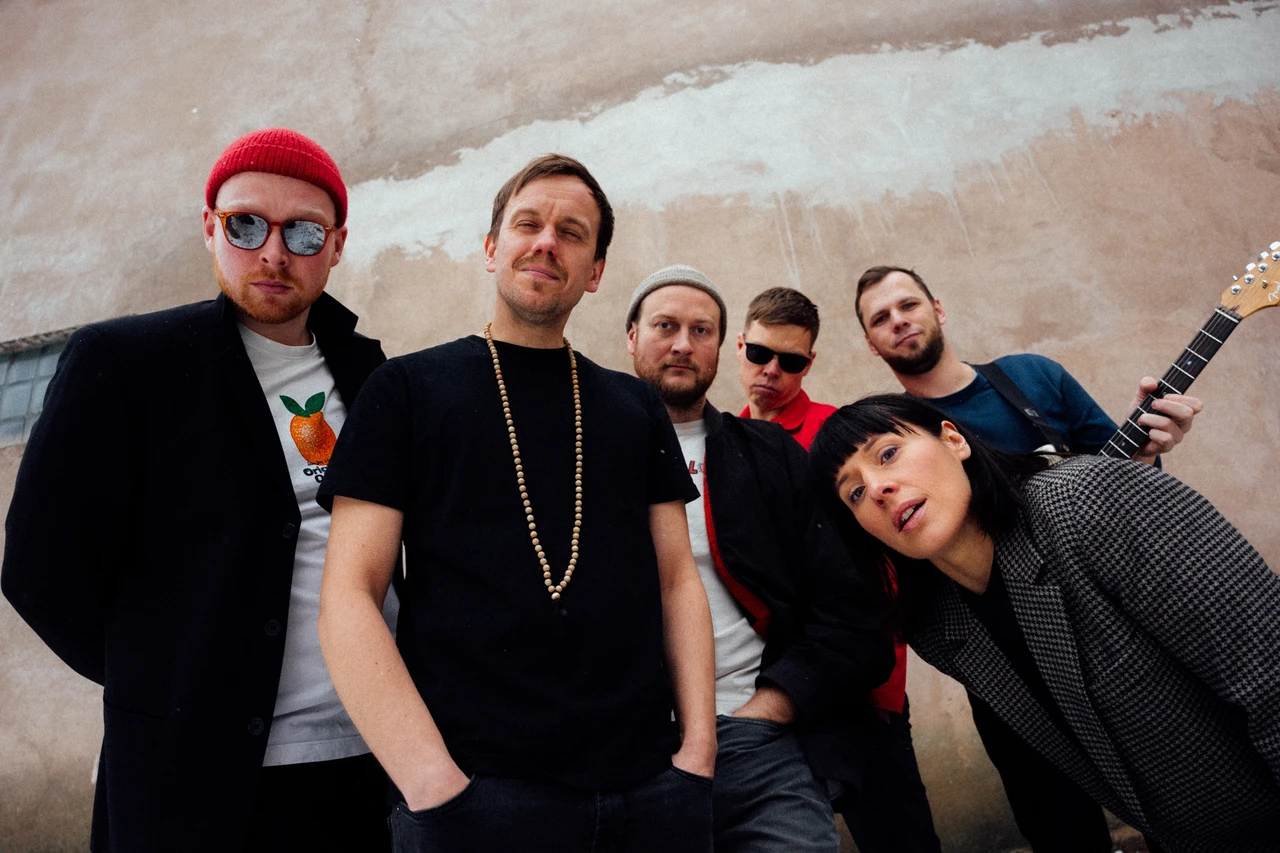
Regina Mänd "A Tribute to Pärnumaa Fiddlers"

RÜÜT
Inspired by Estonian folk traditions, nature, and diverse sounds, RÜÜT seamlessly weaves these influences into their music with both playfulness and mastery. Their third album, Kiriküüt, released in 2023 under the German label Nordic Notes, earned them three accolades at the 2024 Etnokulp awards: Artist of the Year, Album of the Year, and Best New Folk Artist. That same year, the album was also nominated at the Estonian Music Awards. In addition, RÜÜT collaborated with Sander Mölder on the experimental EP Lendas meie kopelisse.
RÜÜT’s namesake is a bog bird called rüüt (the European golden plover, Pluvialis apricaria), a bird whose song captures the very essence of their music: deeply moving and rooted in nature.
Maili Metssalu – fiddle, vocals
Maarja Soomre – melodica, kannel, vocals
Juhan Uppin – Estonian diatonic accordion, kannel, vocals
Jaan-Eerik Aardam– guitar, vocals

Sandra Sillamaa, Piret Päär, Jaan Jaago

Silver Jusilo
Silver is a musician and singer-songwriter whose style has grown out of Estonian indie music and evolved into mellow yet dynamic electronic pop, which is above all always meaningful. He has released two albums: Olekud and Peatükk. The song “Elu Rüpes” from Peatükk reached the quarterfinals of Eesti Laul in 2022. Silver returned to the competition in 2024 with the track “Lately.”
Silver has performed his music on personal tours, at unique events, and at festivals such as Seto Folk, Viljandi Folk Music Festival, and Treski Fest. On stage, he enjoys creating a cosy atmosphere and connecting with the audience in a direct, genuine way.

Simone Minn
Simone Minn is a one-woman band marked by a touch of madness, beautiful melodies, unexpected harmonic twists, and quite a few words. As a unique songwriter, her biggest moment so far was opening for Vaiko Eplik’s album launch concert “Klišeed” at D3 in Tallinn. Simone first appeared on TV in Terevisioon, followed by the release concert of her debut EP “simo” in Viljandi. This summer, Simone begins recording her long-awaited full-length debut album. At a special solo concert on Jaak Johanson’s stage, she will perform several unreleased songs that are finally finding their place on the upcoming record.
It’s not easy to place Simone’s music into a single genre. Some say there’s a hint of Vaiko Eplik, while others hear echoes of The Beatles, Orelipoiss, Syd Barrett, or dodie. In short, her sound lives somewhere between alternative indie and psych-folk.
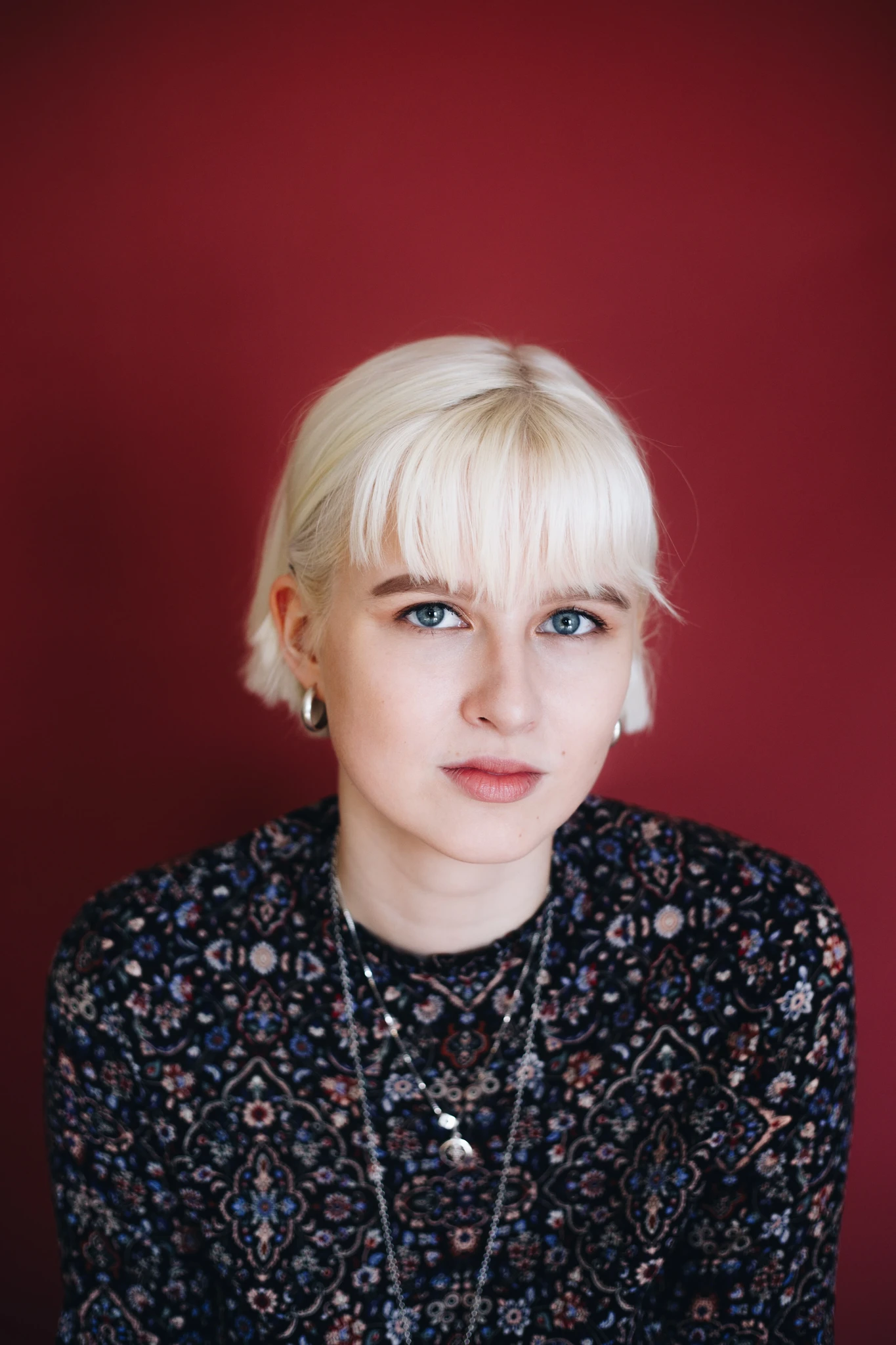
Sounds and Stories from Ruhnu Island
Swedish Estonian heritage lost after World War II is brought to new life with the sound of fiddles, voices and storytelling. It is an interdisciplinary performance grounded in the rich traditional and cultural heritage of a small island in the Baltic Sea. Echoes of the Sea is dedicated to the 80th anniversary of the large-scale exodus to Sweden, which left Ruhnu Island empty of its local inhabitants and centuries-old culture.
The new album is accompanied by a series of videos filmed during expeditions to the island, featuring archival footage as well.
Sounds And Stories From Ruhnu Island shows the way for many artists on how to present folk music and cultural heritage. Musical proficiency, personal involvement, stories, emotions, fun, wisdom – it just makes this little island the center of the universe, as long as the music lives on.
— Balázs Weyer, programming director of Hangvető, Hungary.
Karoliina Kreintaal - fiddle, vocals
Lee Taul - fiddle, vocals
Kairi Leivo - storytelling, vocals

Strand … Rand “From One Shore to Another”
After World War II, most Estonian Swedes continued their lives in Sweden. In recent years, Strand ... Rand has built a new repertoire featuring songs that Estonian Swedes took with them when they left their homeland. Even in the 2010s, people in Sweden were still singing the songs of Mats Ekman (1865–1934), a village singer from Riguldi. In 2011, Sofia Joons and Mall Ney recorded about ten of his songs with singers from Riguldi in a Swedish radio studio. Some of these songs have now been translated into Estonian. After the war, new songs were also written in different Estonian Swedish dialects about their home islands and longing for home. Strand ... Rand’s repertoire also includes songs about escaping in small boats. A large group of Hiiumaa Swedes living in Ukraine was evacuated to Sweden in the summer of 1929 with the help of the Red Cross. Among them was Katarina Utas, who sang hymns in the old style, just as they had been sung in Hiiumaa before 1781. Some of these melodies, uprooted and carried across lands multiple times, will also be part of their programme.
Sofia Joons - vocals, fiddle
Meelika Hainsoo - vocals, fiddle
Mall Ney - harmonium
Robert Jürjendal - guitar
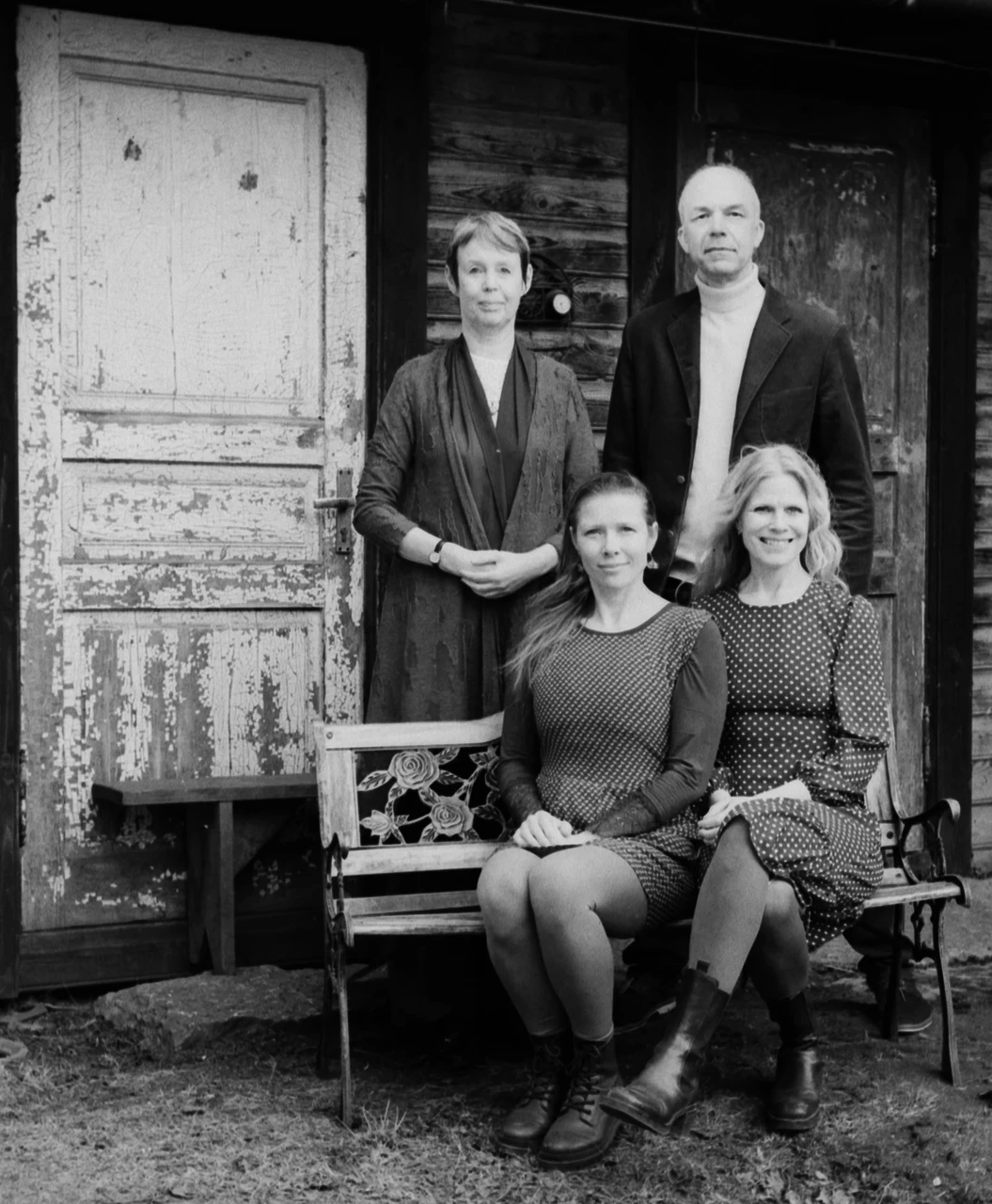
Svjata Vatra 20 "With a blazing flame!"
Svjata Vatra (Holy Fire), plays folk music based on traditional songs with a fresh punk attitude, using bagpipes, jaw harp, scythe, and husky lead vocals – all blown into the 21st century by a shimmering trombone. Since 2006, the band has been making people dance and breaking down walls by demonstrating the shared musical roots of 23 countries. They have performed at many festivals, like Colours of Ostrava, FélSziget, Positivus, Urkult, London IFEM, Kaustinen and Viljandi Folk Music Festival.
Now, they’re ready to take their fiery folk further out into the world. Single “Pane mind põlema” (“Light my Fire”) was used on the soundtrack of the US TV series “Seal Team” in 2017. The band is alumnus of showcase festivals Budapest Ritmo, Tallinn Music Week, Eurosonic, Folk Alliance. In 2020, Svjata Vatra released a CD “World, You are Changing”. Three generations of musicians took part in the production of the album, to point out the importance of the wisdom of grandparents that transfers to children and grandchildren. Now we see the father performing together with his daughter, connecting generations and traditions in the music!
Since 2014, Svjata Vatra has been closely involved in political and humanitarian activism to support Ukraine, both in Estonia and internationally. From February 2022, the Trochynskyi family has been personally leading some of the biggest actions in Estonia. They played a key role in organizing a national benefit concert that raised €720,000 to purchase ambulances for Ukrainian Army Hospitals. Another collaboration with the conductor Kristjan Järvi will result in a concert in Gdansk at the European Solidarity Center on 26 March, which will be followed by an international support campaign. During 2022 Svjata Vatra played more than 40 concerts in 5 countries to support Ukraine. The Ministry of Foreign Affairs gave the annual Cultural Award 2022 to Svjata Vatra. In February 2023 the band went on a 10-days concert tour in Canada and played 8 concerts in 6 cities. On Ukraine's Independence Day, 24 August 2023, Ruslan and Terje Trochynskyi organized a magnificent concert "Ukraine thanks!" in Tallinn’s Freedom Square, featuring Estonian artists, Tallinn Police Orchestra, the Estonian National Male Choir, Svjata Vatra and Ruslana from Ukraine. The concert was broadcasted on Estonian National Broadcast and seen by 118 000 people. “Ukraine thanks!” collected donations for building bomb shelters for schools in East Ukraine. It resulted in building of 52 bomb shelters in East Ukraine cities. In August and September 2024 Svjata Vatra visited Ukraine and performed on the Independence Day of Ukraine in Kiev. The performance of Svjata Vatra has never been as expressive and moving as now, carrying a message for peace.
Ruslan Trochynskyi – vocals, trombone, scythe
Juhan Suits – Estonian bagpipes, wooden horn, whistle, vocals, jaw harp Karl-Heinrich Arro – drums, percussion, vocals
Erki Reim – guitar, vocals
Ken Einberg – bass quitar
Rute Trochynskyi – vocals
Tintura
Karoliina Kreintaal - vocals, fiddle, viola, väikekannel, talharpa
Arno Tamm - vocals, guitar, keyboards
Taavet Niller - vocals, double bass, bass guitar
Lauri Täht - DJ, percussions

Trad.Attack!
Trad.Attack! have made it their mission to constantly challenge themselves, to be dedicated and to surprise not only their fans but themselves as well. This year, the band will celebrate its 10th anniversary! During the last ten years, the band has released five studio and three digital albums, all of which open up a world of complexities. The band’s goal to perform in every country of the world has taken them to 38 countries already and to almost every continent, with concerts in Australia, Canada, Chile and Malaysia. In their home country, the band tours nationwide and gives large scale concerts. Trad.Attack! have been recognised and honoured in Estonia with 29 music awards, including Band of The Year and Album of The Year. Their latest full-length album, "Bring It On", was released in March 2023, and reflects the changes in the band members themselves and the world around them. In addition to new instruments, the band members have crossed musical paths with a number of musicians from home and abroad, such as the Georgian vocal choir Iberi, the Canadian folk-pop band The East Pointers, the founder of the band Yemen Blues, Israeli-born musician Ravid Kahalani, the authentic seto choir and others.
Sandra Sillamaa - Estonian bagpipes, Jew's harp, glockenspiel, whistles, vocals
Jalmar Vabarna - guitar, vocals
Tõnu Tubli - drums, brass instruments, vocal
Trifoor
Marta-Helene Hansing - fiddle, vocals
Ariana Arutjunjan - guitar, vocals
Emma Lotta Kiviberg - flute, vocals
Emilia Peil - drums
Kristina Kullang - bass guitar

Tuulebant+
With their 10th anniversary coming up, they figured it was the perfect time to mix things up, see what other instruments everyone could play, and bring in some extra friends to join them on stage for the big celebration!
Richard Ott Leitham - accordions, banjo, vocals
Karl Kobin - fiddle, vocals
Kert Krüsban - guitar, vocals
Ernst Valdmaa - bass guitar, vocals
Uku Zolgo - Estonian accordion, vocals
Ott-Mait Põldsepp - mandolin, guitar, vocals
Sander Udikas - pipes, saxophone, vocals
Tõnis Kirsipu - percussions

Untsakad
The embodiment of the most refined and absolute folk art in Estonia, the band Untsakad represents the finest and most highly esteemed acoustic values of traditional musical heritage. Their sonorous expression and instrumental virtuosity form a synergistic symphony, where harmonic resonances intertwine with the deep layers of historical cultural space.
Like a perfectly aged grand cru wine, the sound texture of Untsakad has only gained depth and nuance over time. Their interpretations of folk songs are not just musical performances, but finely composed masterpieces offering multisensory experiences, where every note and pause is precisely calibrated and emotionally charged.
The band’s instrumental ensemble – guitar, fiddle, diatonic accordion, bass guitar, and mandolin – creates a polyphonic spectrum, whose unmistakable symbiosis and timbral delicacy exude symphonic grandeur.
Jaanus-Paanus – the grand engineer of acoustic architecture, whose guitar sounds like the ultimate manifestation of symphonic polyphony, with a timbral spectrum that spans from Baroque concert hall majesty to impressionist sonorist softness. His playing technique combines the fine detail of Renaissance lute artistry with the postmodern eclecticism of the 21st century, with vibrations that resonate with the listener’s acoustic receptors, creating quadriphonic euphoria and metasonic ecstasy.
Ilmar-Pilmar – the apologist of string instruments and the erudite violin virtuoso, whose vibrato is as finely refined as Michelangelo’s David – perfectly shaped, expressive, timeless, and sensually elegant. It touches the listener’s soul like a golden sunbeam that turns into a silvery reflection over a rainy landscape. His fingers shape each note into a perfectly resonating sound, as if it was created with a divine touch.
Marek-Paarek – the master of low frequencies, whose bass vibrations are not just sound, but a cosmic force that grabs the listener and takes them beyond the horizon of sound, precisely where life and death meet. Every bass note is like a natural force, rendering the listener motionless while simultaneously opening a new world.
Margus-Pargus – the Grandmaster of accordion art, whose manual precision and timbral perfection have reached a level where every movement of air in the bellows is like a Swiss watch mechanism with harmonic rhythm. His fingers move along instrumental paths like a perfectly tuned clockwork, where every movement is part of a larger harmonic whole. His soul lives in every song that resonates like timeless art. He is also a vocal maestro who can represent the entire emotional depth of humanity in a single note. His voice is a vocal epiphany capable of filling the stage with its power, with every note carrying a radiant harmonic force.
Põlder-Mulder-Scully – the mandolin virtuoso, whose hands transform music into a glowing sonoristic magic. Every string movement is like a delicate yet spicy dance, transporting the listener to an era where each note is imbued with ancient, timeless mysticism. His playing precision is so surgical that each chord sounds like fine art – leaving a mark of perfection on everything.
Tauno-Pauno – the master of acoustic balance, ruling the sonic landscape with precise calibration and grandeur. He is the true architect of acoustic architecture, able to balance every frequency like the gravitational pull of a cosmic black hole, pulling all sound vibrations into perfect resonance. His fingers are like a scientist’s precise instruments, every press, every movement performed with the highest elegance and perfectionism, enabling each harmony and chord to reach the listener with absolute clarity and perfection. His sound engineering work is the absolute mastery of sonic creation – every note is meticulously shaped to offer the listener not just music, but a complete acoustic experience, transforming each individual sound into an admirable work of art.
The music of Untsakad is like an auditory decadence – a sensual feast for the ears, where every note and pause serves a fundamental purpose. Their performance is not just a concert, but a high-class cultural degustation, where each beat is like the finest drop of wine – carefully selected, perfectly balanced, and utterly delightful.
If Estonian folk music were wine, Untsakad would be its finest reserve – deep, rich in nuance, and only getting better with time.

Vabariigi Pillimees Toomas Valk

Väikeste Lõõtspillide Ühing

VASSVIK/SILVOLA/STRYPE

Veljo Tormis sing-along

Zetod

Zhorzhyny





